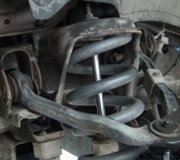One thing that was overlooked is the replacement transmission. It likely has the wrong type of fluid in it. You can verify this by observing the shudder never occurs right away after starting a cold engine. In winter, you'll need to drive a good three to seven miles before it occurs. In summer, perhaps as little as a mile.
The biggest clue is when this occurs, hold road speed and the accelerator pedal perfectly steady, then with your left foot, lightly tap the brake pedal. The shudder will stop for a couple of seconds, then come back.
This is caused by the lock-up clutch in the torque converter. It locks up to provide lower engine speed and better fuel mileage at higher speeds. At around 35 - 40 mph, or 30 mph in your case, it is under partial lock to cause it to engage slowly, for comfort. The transmission fluid doesn't have the right combination of additives to allow that to happen. The clutch grabs too aggressively, then engine torque breaks it free, then it tries to grab again. Once the fluid is changed, the clutch will be able to slip smoothly until it locks up solidly.
This clutch also doesn't lock up at all until the engine reaches a certain temperature. It unlocks when you tap the brake pedal in anticipation of slowing down to a stop. On most cars it will also unlock from just releasing the accelerator pedal to coast, and it usually unlocks at anything over about 3/4 throttle. Due to the characteristics of torque converters, when they are unlocked, they transmit twice the torque from the engine to the transmission compared to a manual transmission. When locked up, you lose that torque doubling. That is beneficial when pulling out to pass or when going up a steep hill. That's why it unlocks at high throttle.
Once you get above roughly 35 mph, the clutch will lock up solidly, so there won't be that shudder.
Tuesday, January 28th, 2020 AT 4:50 PM



